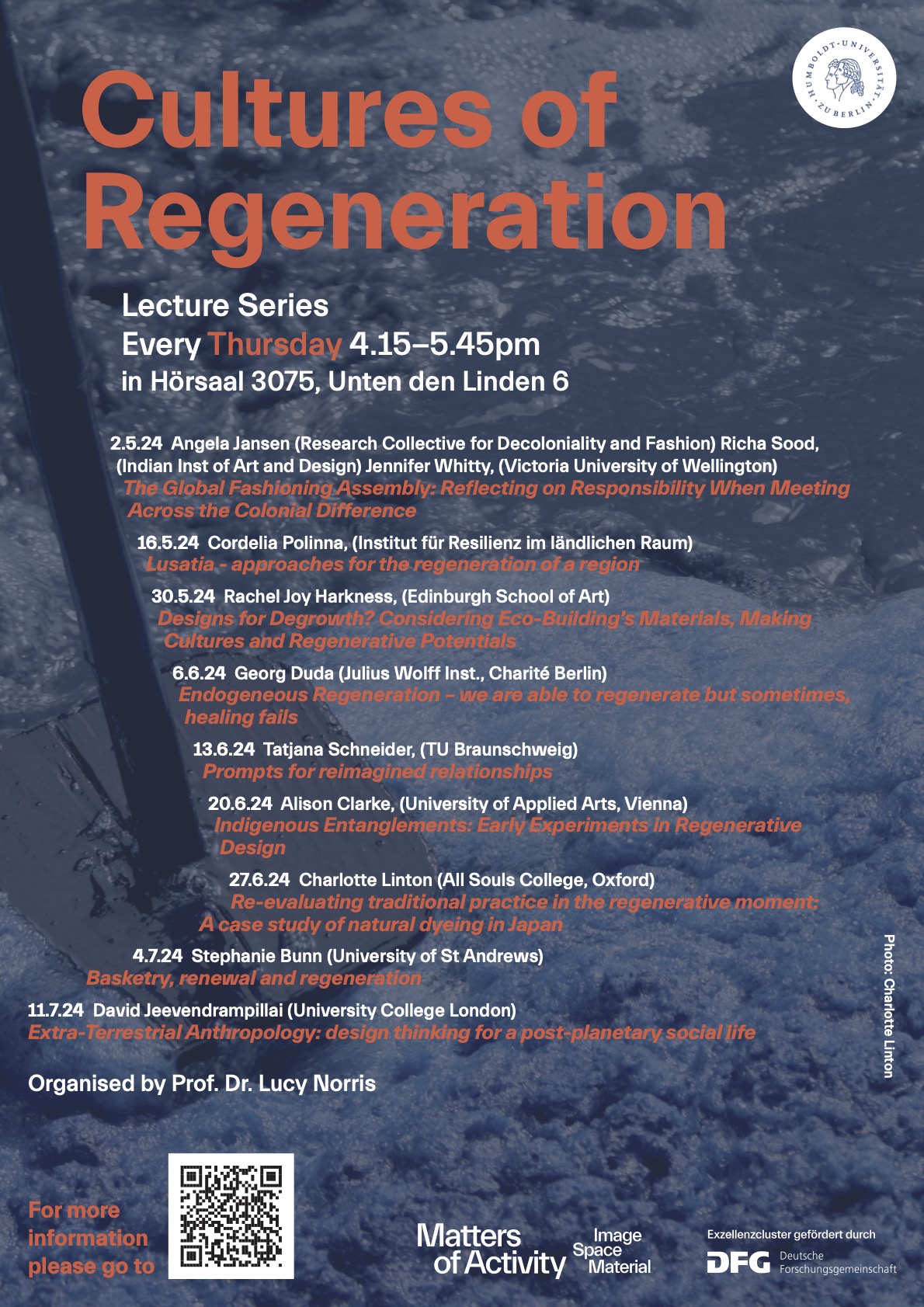
This guest lecture series will explore the critical questions that diverse cultures of regeneration prompt, from the reconfigured pasts they invoke to the possible futures they open up. Invited speakers will discuss their work in relation to a wide range of fields of human activity, from architecture and the built environment to agriculture and food, textiles and fashion, multi-sensory technologies and other-worldy materialities.
Increasing socio-ecological damage and the urgent need for care, repair and recovery has led to calls for regenerative design as a means of wayfinding towards a just and sustainable life on earth. Aiming to (re)design the way we live to align with and support the functioning of natural ecosystems, regenerative systems thinking is being applied to fundamental fields of human activity, from the production of energy to cities, agriculture, food, fashion and finance, and is moving away from the margins of alternative economies. In Designing Regenerative Cultures, Wahl suggests that regeneration is about reconnecting people in place, designing prototypes that point to future possibilities, and creating a dynamic capacity to move forwards. Drawing on biological models of replacement, regrowth, reassembly and revival, ‘regeneration’ can be examined at the level of the cell through to the organism and the collective, prompting broader questions as to the relationships between scales, and to what extent changes at the micro level change macro structures and vice versa. As a situated practice, regenerative design is also aligned with building community and networking diverse local actors to self-organise and experiment with new ways of making and being.
However, regenerative movements are inherently social and political expressions of heterogenous cultures and desirable futures, and as such are deeply intertwined with contested pasts and relations of power and representation. Looking for traces of former ways of being in world, and increasingly turning to ‘indigenous knowledge’ as a reference for ways to move forwards, regenerative design models raise critical questions as to whose narratives of the past are being evoked, who has the right to speak for whom, and what is being remembered and what forgotten. Similarly, what concepts of the future are being imagined, by whom and for whom, and how might some forms of living be enabled while other possibilities are negated?
Key Info:
Students are warmly invited to the Symposium 'Metabolism/Stoffwechsel' on 18.4.24 at Weißensee Kunsthochschule Berlin, 9.30-17.30, programme here in Moodle course, please register https://www.eventbrite.com/e/symposium-metabolism-stoffwechsel-tickets
- The series starts on 25.4.24.
- The lecture series will be held in Hörsaal 3075, Unter den Linden 6, and will be held in English.
- Lectures will begin at 16.15, please arrive in good time to avoid disrupting others.
- Students are required to attend in person. Lectures will not be recorded.
- Guest lecturers will either give their talks in person or via remote connection in the Hörsaal.
- 3LP will be awarded for active participation in the lecture series, discussion following each talk, and writing a summary of 2-3 pages of one lecture.
- Summaries should be uploaded into Moodle within one week. Students will be able to sign up at the beginning of the semester for one lecture to summarize, and together these will serve as a repository of information about each lecture.
- Modulabschlussprüfung (4LP) - students may write an essay (Hausaufgabe) for either course (MA Ringvorlesung / BA seminar). Length: 10-12 pages (EN, preferred) or 12-15 pages (DE). Essays to be emailed to lucy.norris@hu-berlin.de by 30.09.24.
- Kursverantwortliche/r: Lucy Norris